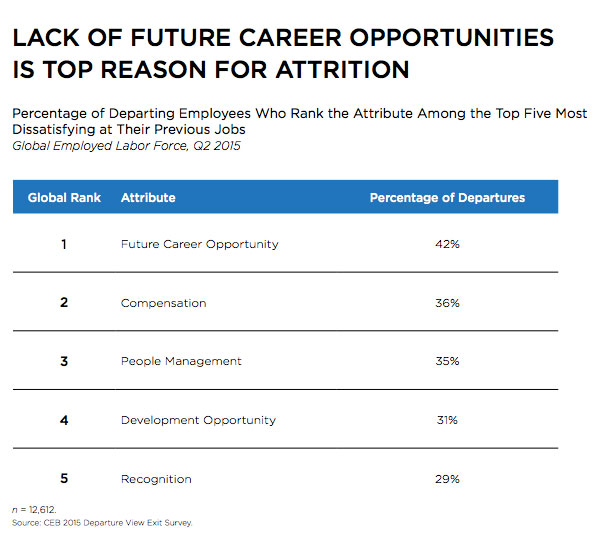This past spring, I wrote an article that ended up getting a ton of feedback, and one particular thing permeated nearly every comment: short-sighted management is causing sales teams to rot from the inside out.
What do I mean by short-sighted management? This CEB study sums the answer up nicely. In discussing the main reasons salespeople leave their jobs, the report also perfectly summarize the qualities of (or lack thereof) short-sighted sales managers and why they’re a problem for the whole team.
Let’s go through each one, as well as some thoughts on improving what companies can offer their salespeople.
1. Future Career Opportunity
On first glance, it looks like the biggest reason people leave their job isn’t even related to their manager, right?
Wrong. The average tenure of a sales development rep (SDR) at one company is between 9 and 15 months—which means I have plants in my apartment that last longer than most SDRs. And something the CEB report strongly implies is that people leave their jobs because their manager(s) failed to give them a clear career path.
There’s a simple reason for this. Most SDRs expect to eventually become account executives (AEs). But often when they reach that point, they’re instead told there isn’t any room for a new AE. Or, even worse, their company grabs an outside hire because it wants someone with more experience.
To be fair, companies don’t all grow at the same rate, and a job that could pay more than some lawyers make doesn’t miraculously open up because a single SDR hits their one-year mark. Nor should a rookie fill that role.
But that doesn’t mean you, as the manager, should leave your SDRs with a dangling carrot. To keep SDRs longer term and stop paying the price of attrition, managers have to start offering rewards today instead of promising some gigantic promotion in the future.
Simple things like micro-promotions (e.g., Tier 1-3 SDR) and trusting (note I didn’t say thrusting) additional duties on employees can go a long way in helping them feel valued and build loyalty.
Ultimately, it comes down to a manager’s willingness to help their employees progress.
2. Compensation
Say you pay your SDR a $40,000 base salary, with a $65,000 on-target earnings one. That’s decent entry-level pay, but it becomes a problem at the employee’s one-year mark, when you offer that 1–2 percent raise. Statistically, the SDR is already at the time of abandonment for the job. Do you really believe that extra $800 will incentivize anyone to work their ass off for another year when they could get a 20-percent increase just by finding a new gig?
Instead of letting the talent you spent a year developing run off to another company, design your compensation so that it gives them a reason to stick around. Offer a significant raise in base for every year they stay, assuming they are performing at their expected level. Alternatively, offer micro-raises throughout the year to keep them hungry. A SDR with three years’ experience at your company and a desire to succeed will generate a hell of a lot more opportunities than the rookies you keep hiring and losing every year.
Don’t believe me? Check out this employee turnover calculator and tell me a 10–20 percent raise is expensive.
3. People Management
As a manager, how much do you really care about your employees? Are they a butt for a chair or someone with individual strengths, weaknesses, and experiences that can be celebrated and leveraged? If you only look at the team instead of the individuals, you’ll probably miss some seriously awesome abilities that haven’t had a chance to surface.
Spend time “in the trenches,” dialing with them. Coach them in their successes and failures. Motivate through passion rather than fear. And get to know them. So what if they don’t hit their KPI today because you took them for a beer. Twenty less dials will not significantly impact your annual numbers.
Everyone longs to be a part of something bigger than themselves. Your job as a manager is to show them where they fit in and help them see the importance of their job beyond the numbers. Treat your employees right today and they will treat you right tomorrow.
4. Development Opportunity
Give your employees the opportunity to grow in the company, but also in their own skills. Does your SDR want to close deals? Send them on a sales call to shadow an AE. Buy your team books or spend an hour a week as a group watching a LinkedIn Learning course. Encourage a culture of taking chances.
Quite simply, very few people are born natural sellers, so stop assuming every rep will succeed without some development. If you stop focusing only on today’s numbers and instead work on building a team of learners, you will create a culture of earners.
5. Recognition
Recognition doesn’t always need to be loud or expensive. A sales leader simply acknowledging the hard work of a rep can go a long way.
Did a struggling rep have a better month? Buy them lunch and tell them you’ve seen how hard they work. An ounce of positivity will return in gallons of effort, especially if you are managing someone who is motivated by affirmation. Don’t tell HR you are using love languages at work though.
Have thoughts about effectively managing salespeople? Share them in the comments below.




